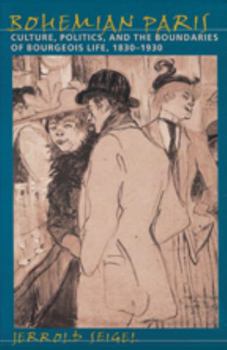Bohemian Paris: Culture, Politics, and the Boundaries of Bourgeois Life, 1830-1930
Select Format
Select Condition 
Book Overview
Exotic and yet familiar, rife with passion, immorality, hunger, and freedom, Bohemia was an object of both worry and fascination to workaday Parisians in the nineteenth century. No mere revolt against middle-class society, the Bohemia Seigel discovers was richer and more complex, the stage on which modern bourgeois acted out the conflicts of their social identities, testing the liberation promised by post-revolutionary society against the barriers...
Format:Paperback
Language:English
ISBN:0801860636
ISBN13:9780801860638
Release Date:September 1999
Publisher:Johns Hopkins University Press
Length:464 Pages
Weight:1.50 lbs.
Dimensions:1.1" x 6.0" x 8.9"
Grade Range:Postsecondary and higher
Customer Reviews
4 ratings
Everything I needed to know about life in Paris at this time.
Published by Thriftbooks.com User , 16 years ago
I needed facts for a group of artists who were painting for an exhibiton with a turn of the century Paris theme. This book was well written, entertaining, and contained some little known details for these well known and well read artists. The Exhibition was planned to highlight "Le Chat Noir", the caberet where many artists gathered just before the turn of the century, and the book gives life to the Caberet scene in Paris, as well as the total Bohemian scene there in that time frame. This book was so good in many other ways, that every one of the artists decided to read the whole book. I highly recommend it.
History with whimsy
Published by Thriftbooks.com User , 16 years ago
The cover of this book is so telling about the contents that I searched for the poster to hang it in my voice studio. The time and place of early Cabaret is very intriguing to me and this book gave the details of the social canvas behind the whimsy of the art form. This is one of the most wonderful ways to read history. It IS NOT DRY. It springs up your imagination. songbird@avavictoria.com
Short and Sweet...
Published by Thriftbooks.com User , 22 years ago
After reading the only review posted of this book, I thought maybe I hadn't actually read the said book. I'll blame it on how I tend to skim through these sorts of things hardly paying attention. Point is, the review lost me in about the first two sentences. John Lennon? I don't criticize the review or anything - I can, indeed, make the connections - but I read the book more for the information on Murger, Verlaine, Jarry, and the rest of them... So what I'm trying to say is, if you want a great bohemian read totally packed with interesting stuff, read the book. It's a good one.
The First Bobos
Published by Thriftbooks.com User , 24 years ago
I first came across this book several years ago when writing about Jacques Offenbach. At that time, I much enjoyed both the author's erudition and his dead-on social analysis. Seigel demonstrates how, in mid-nineteenth century Paris, the eager purchase by the bourgeois of "revolutionary" works of art (literature, paintings, drama, music, etc.) deadened the intended meaning of those works, and, by making their creators wealthy, changed the artists' own feelings about their society. Seigel sees this cooption as an intrinsic function of capitalism, and its own best defense against violent revolution. The parallels for our society seem clear to the reader (Seigel does not discuss them) - just as Henri Murger, author of "La Vie de Boheme", grew rich enough to buy a country estate (and then killed himself) so John Lennon took the money from "Revolution" and bought New York real estate. Mick Jagger is today one of the largest and wealthiest landowners in Britain - and one could extend this list indefinitely.Over the years, I thought of Seigel's analysis on occasion - for instance, when reading plaintive complaints about the "misuse" of rock in TV commercials. But I didn't bother to pick up the book again until reading a new book with "bohemian" and "bourgeois" together - Brooks' "Bobos in Paradise" - which does not cite this book. Hmm. It's very true that Brooks may simply be a keen observer - after all, our intellectual culture is a direct descendant of that discussed by Seigel. So let's leave it at that - and suggest that anyone seriously interested in "Bobos" would do very well indeed to read this volume.





